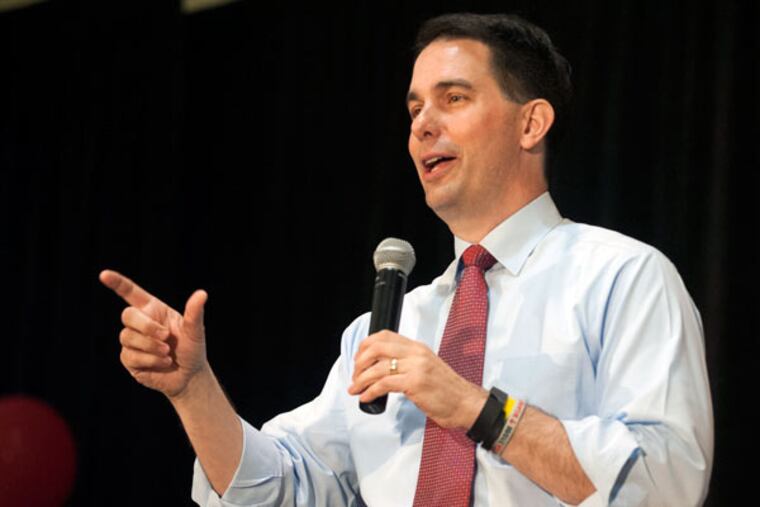Wisconsin’s union law worked. Now it’s Pennsylvania’s turn.
Giving government workers the choice of whether or not to join a government union can empower them — and help a state’s bottom line.

Talk about unions is heating up. Just look at Amazon and Starbucks. Bernie Sanders says that Democrats need to encourage workers to unionize in order to avoid a grim November.
But workers don’t need unions to protect them. Giving government workers the choice of whether or not to join a government union can empower them — and help a state’s bottom line.
» READ MORE: Unions are brewing at coffee shops and restaurants. Will they change Philly’s food scene?
Some of you may remember that in 2011, Wisconsin effectively limited collective bargaining for many public employees by passing Act 10. The act made union dues optional for workers in local and state governments such as public school teachers and prison guards, required many of these unions to hold annual votes to re-certify the unions, and prevented them from bargaining for unreasonably high raises. Act 10 received a lot of pushback at the time. Now, 10 years later, there are fewer union members in Wisconsin (from 14.2% in 2010 to 8.7% in 2020) and the state is in great financial shape.
We believe Pennsylvania has a lot to learn from Wisconsin’s example.
The goal of Act 10 was to remove unfair powers wielded by government union executives over state budgets, education policy, and politics.
A recent study from the Commonwealth Foundation found that Act 10 saved Wisconsin taxpayers nearly $7 billion in 2018. Other analyses from a free-market think tank in Wisconsin suggested it helped resolve a $3.6 billion deficit without raising taxes, while the savings produced by Act 10 enabled future tax cuts that helped create 42,000 new jobs — including 20,000 jobs in manufacturing. Thanks to the reduced influence of government unions over state education policies, the number of low-income children benefiting from Wisconsin’s school choice program has increased nearly thirtyfold, to almost 15,000 students.
“As seen in Wisconsin, where public-sector labor reform leads, prosperity follows.”
Pennsylvania and other similarly situated states could benefit from following Wisconsin’s example. The Keystone State has more government union workers than any other state except California, New York, and Illinois. Most of these workers lose a chunk of their paychecks each month to pay union executives who often prioritize a political agenda ahead of the workers they claim to represent. And look at what those government unions are achieving: Pennsylvania has the country’s fourth-highest unemployment rate and the second-highest business tax rate, while ranking 45th in economic performance.
As was the case in Wisconsin before Act 10, government unions are the largest campaign contributors in Pennsylvania. Since 2007, these groups have spent more than $150 million on politics, with 90% of campaign contributions going toward Pennsylvania Democrats. These government unions lobby for more government spending, against reforming the state’s pension system, for a government-run liquor monopoly, and against educational options for children and families.
Pennsylvania is not alone. A recent analysis showed that during the last academic year, the nation’s largest teachers’ union spent more on politics than on representing its own members.
Union executives expect returns on their investment. Vice President Kamala Harris visited Philadelphia in April to tout the administration’s support for unionization. From overturning the results of union elections, to pushing the PRO Act that would allow unions to collect dues even from workers who have opted out of the union, to eliminating the secret ballot in union elections (which leaves members vulnerable to peer pressure by union members), politicians and government agencies have taken extreme measures to prioritize union executives over individual workers.
Act 10 set government employees free from government union control and eliminated the special privileges that gave government unions an undue amount of political influence. What followed was a cascade of commonsense reforms that saved taxpayers billions, helped create jobs, and improved education.
Pennsylvania lawmakers can reap similar rewards by following the Wisconsin playbook. The Pennsylvania House recently advanced a package of bills that would implement Wisconsin-style public-sector labor reforms. Specifically, these bills would stop the taxpayer-funded collection of political donations, empower public employees with the choice to join or leave a government union at will, and give workers options to choose representation through different unions.
As seen in Wisconsin, where public-sector labor reform leads, prosperity follows. Requiring government union executives to play under the same set of rules as everybody else clears the path for balanced budgets, tax relief, school choice, and a level playing field for workers.
Charles Mitchell is president and CEO of the Commonwealth Foundation. Scott Walker, former governor of Wisconsin (2011–19), is the president of the Young America’s Foundation.